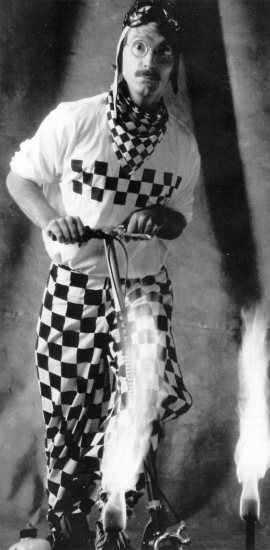
David Aiken |
Page 17 Winter 1995 - 96
|
DAVID
AIKEN Checkered
Past Chequered Future BY
TANJA HUTTER
What
does juggling have in common
From
humble beginnings in his mother's laundry
room, young David taught himself how to juggle with socks that
he was rolling up to put away. When he was 13 and broke, he needed to
replace a pedal on his bike, so he hit the streets of Ottawa. His
friends suggested he try juggling on Sparks Street where other huskers
performed. He recalled, "They told me there were some awful
musicians down there and they made money so I should be able to,
too." After earning enough for the pedal, the forces of
entertainment were released from within, and since then he has not
looked back.
Although
he credits several workshops
His
costuming began in the mid-80s, when checkered Vans sneakers were all
the rage. Aiken wore his while performing, and he eventually made
himself checkered wraparound pants to match. The transformation
became complete at an Amherst mini-convention when someone gave him a
checkered bandana. The Checkerboard Guy moniker was given to him by
stand-up comedian and fellow-juggler Joe Murray, though not until a
couple of years later.
He
said, "I was looking for a hook to make myself different from all
of the other jugglers and it just seemed to work. Sure there may be
other jugglers who use checkerboards in their show, but there is
really only one Checkerboard Guy."
Aiken
also pointed out that people easily identify with a strong personality
or image, which means
they can be drawn more deeply into the performance and enjoy the show
even more. It also means they are more likely to remember you later on
if they are looking for an entertainer.
But
costumes often aren't enough to distinguish one juggler from others on
the circuit, so Aiken devised a finale to separate him from the crowd.
As he begins his show, an energetic version of "Sing, Sing,
Sing" blares from the sound system while The Checkerboard Guy
gathers a crowd with antics such as shaker cups, cigar boxes, seven
ball juggling, and casting a fishing rod with a rubber spider attached
as bait at people passing by.
When
the music dies down he holds the attention of his audience with a ball
spinning routine, helped by a young volunteer. He then juggles clubs,
balances on a freestanding ladder, and exchanges a few Tarzan yells
with another volunteer. The latest addition to his show, the finale,
is a stunt parody of Evel Knievels jump across Snake River Canyon.
Instead of the Sky Cycle X-2 though, he has a tiny Go-ped scooter that
he jumps over a
For
his first three years performing he became very familiar with the
street scene in
Ottawa, but eventually he began to make small trips to Montreal,
Toronto and
Baltimore.
In
1988, The Checkerboard Guy really began to tour, juggling at festivals
in Ottawa, Fredericton and Halifax, winning a couple of
In
addition to his career in
In
a perfect world, performers agents
would balk at getting a |

David Aiken |